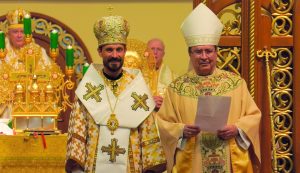 Pope names Bishop Milan Lach, SJ, as the Bishop of Ruthenian Eparchy of Parma
Pope names Bishop Milan Lach, SJ, as the Bishop of Ruthenian Eparchy of Parma
WASHINGTON—Pope Francis has appointed as Bishop of the Ruthenian Eparchy of Parma, the Most Reverend Milan Lach, SJ, who up until now served as apostolic administrator of the Eparchy.
The Byzantine Catholic Eparchy of Parma is the Catholic eparchy governing most Ruthenian Catholics in the mid-western United States. It is headquartered in Parma, Ohio.
The appointment was publicized in Washington, DC, June 1, 2018 by Archbishop Christophe Pierre, apostolic nuncio to the United States.
Bishop Lach, 44, was born in Kežmarok, Slovakia in 1973. In 1992, he was admitted to the Greek-catholic seminary in Prešov and in 1995 entered the novitiate of the Society of Jesus in Trnava, Slovakia. He continued his studies at Trnava University and also studied at the Pontifical Oriental Institute in Rome, where he obtained a master’s degree from the Eastern Church Sciences and later, a doctorate degree. In 2009, he began working at the Center of Spirituality East – West of Michal Lacko in Košice, Slovakia.
He was ordained a deacon of the Society of Jesus on November 11, 2000 and was ordained a priest on July 1, 2001. He was appointed auxiliary bishop of Prešov and titular bishop of Ostracine on April 19, 2013. He was ordained as auxiliary bishop of Prešov and titular bishop of Ostracine, June 1, 2013. On June 24, 2017, Pope Francis named Bishop Lach as apostolic administrator of the sede vacante (vacant see) of the Epharcy of Parma for the Ruthenians.
The Eparchy of Parma for the Ruthenians was erected February 21, 1969. Currently, the Eparchy of Parma encompasses the geographical area of Ohio (except the eastern border counties), Indiana, Michigan, Illinois, Wisconsin, Minnesota, Missouri, Iowa, Kansas, Nebraska, North Dakota and South Dakota. Byzantine Catholics living in those states are members of the local Church of Parma.
Cf. Horizons
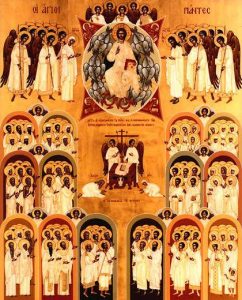 Over the last fifty-some days, we have celebrated the Paschal mystery – the central mystery of our faith, from our Lord’s crucifixion, resurrection, ascension to his sending the Holy Spirit on his followers. This Sunday, after all that has been proclaimed, we add a great “Amen!” “So be it!” This “Amen” will be great only if we make it more than just words but also actions. The Holy Spirit came upon the disciples that they might be witnesses to the Paschal mystery – our Lord’s death and resurrection, and the Greek word for “witness” is “martyr.”
Over the last fifty-some days, we have celebrated the Paschal mystery – the central mystery of our faith, from our Lord’s crucifixion, resurrection, ascension to his sending the Holy Spirit on his followers. This Sunday, after all that has been proclaimed, we add a great “Amen!” “So be it!” This “Amen” will be great only if we make it more than just words but also actions. The Holy Spirit came upon the disciples that they might be witnesses to the Paschal mystery – our Lord’s death and resurrection, and the Greek word for “witness” is “martyr.”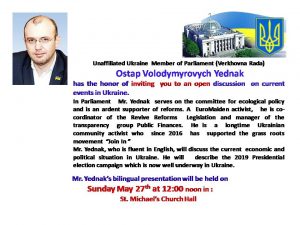 The St. Michael the Archangel Ukrainian Church community in New Haven welcomes Ostap Yednak, member of the Ukrainian Parliament (Verxovna Rada), who will speak on the current political, economic and security situation in Ukraine as well as the Presidential campaign currently underway.
The St. Michael the Archangel Ukrainian Church community in New Haven welcomes Ostap Yednak, member of the Ukrainian Parliament (Verxovna Rada), who will speak on the current political, economic and security situation in Ukraine as well as the Presidential campaign currently underway.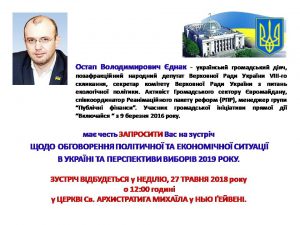
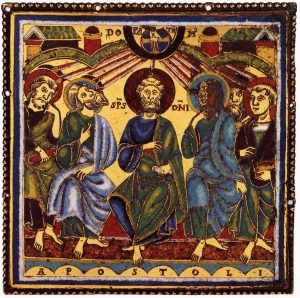 Pentecost is the fiftieth day, “the last and greatest day of the feast.” In the New Testament, this story is told only in the Acts of the Holy Apostles (Acts 2:1-12). On this day, the Holy Spirit came upon the disciples in the form, “as of fire” and they were filled with the Holy Spirit. (Acts 2:3) From this event, some observations can be made:
Pentecost is the fiftieth day, “the last and greatest day of the feast.” In the New Testament, this story is told only in the Acts of the Holy Apostles (Acts 2:1-12). On this day, the Holy Spirit came upon the disciples in the form, “as of fire” and they were filled with the Holy Spirit. (Acts 2:3) From this event, some observations can be made: The Resurrection and the Ascension are two separate concepts. This was known by the Gospel writers, particularly St. Luke. St. John also distinguishes the two, when Mary Magdalene meets the Risen Lord. Jesus says to her, “Stop holding [traditional: “do not cling to me”] on to me, for I have not yet ascended to the Father” (John 20:17). The Resurrection is the restoration to life of his human body, the Ascension is the glorification of Jesus, both God and man, at the right hand of the Father: “… the angels marveled at the sight of a human being more exalted than themselves. Today, the Father receives again in his bosom the one who was in him from eternity” (First sticheron at Psalm 140, Feast of Ascension).
The Resurrection and the Ascension are two separate concepts. This was known by the Gospel writers, particularly St. Luke. St. John also distinguishes the two, when Mary Magdalene meets the Risen Lord. Jesus says to her, “Stop holding [traditional: “do not cling to me”] on to me, for I have not yet ascended to the Father” (John 20:17). The Resurrection is the restoration to life of his human body, the Ascension is the glorification of Jesus, both God and man, at the right hand of the Father: “… the angels marveled at the sight of a human being more exalted than themselves. Today, the Father receives again in his bosom the one who was in him from eternity” (First sticheron at Psalm 140, Feast of Ascension).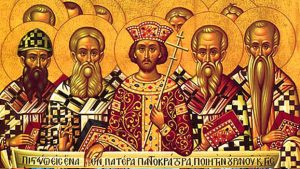 “Holy Father, keep them in your name that you have given me, so that they may be one just as we are” (John 17:11).
“Holy Father, keep them in your name that you have given me, so that they may be one just as we are” (John 17:11).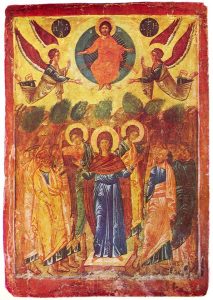 The ascension of our Lord into glory is the seal on his resurrection. Jesus taught Nicodemus, “No one has gone up to heaven except the one who has come down from heaven, the Son of Man” (John 3:13). St. Paul further explains that the ascension is the sign of his victory over the Hades, the kingdom of death, “What does ‘he ascended’ mean except that he also descended into the lower regions of the earth? The one who descended is also the one who ascended far above all the heavens, that he might fill all things” (Ephesians 4:9-10).
The ascension of our Lord into glory is the seal on his resurrection. Jesus taught Nicodemus, “No one has gone up to heaven except the one who has come down from heaven, the Son of Man” (John 3:13). St. Paul further explains that the ascension is the sign of his victory over the Hades, the kingdom of death, “What does ‘he ascended’ mean except that he also descended into the lower regions of the earth? The one who descended is also the one who ascended far above all the heavens, that he might fill all things” (Ephesians 4:9-10).